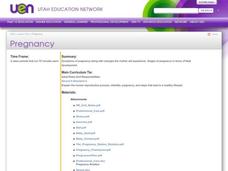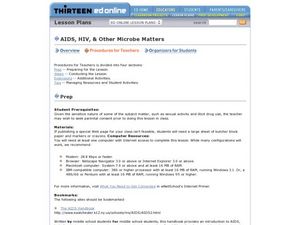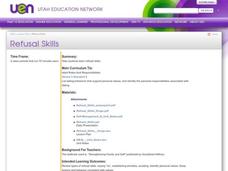Curated OER
Risky Business
High schoolers view a video on AIDS, HIV and the ways in which HIV is spread. They discuss ways to avoid contracting HIV and participate in a simulation that shows the growth of a communicable disease.
Curated OER
STDs
Students list the common types of STDs, HIV/AIDS and their symptoms. They complete worksheets concerning adult roles and responsibilities and determine ways to avoid disease. They use study guides and web sites to examine pertinet...
Curated OER
Pregnancy
Students view a PowerPoint presentation about pregnancy. They work in groups to complete activities at each of six stations. Students create a baby from clay dough. They use construction paper to design a quilt square. Students complete...
Curated OER
Communication: Saying No
Students read about psychology by identifying uncomfortable teenage situations. In this sexual awareness lesson, students read assigned text which discusses the importance of saying "no" when you are in a hostile or uncomfortable...
Curated OER
Family Life And Sexual Health
Students investigate the philosophy of health as outlined in the FLASH curriculum. They practice how to appreciate and respect themselves in respect to sexuality and overall wellness. There is also a section of the lesson that focuses on...
Curated OER
HIV/AIDS: Basic Facts
Students investigate human sexuality by researching STD's. In this HIV activity, students discuss the potential risk of getting a sexually transmitted disease such as HIV which can cause illness and death. Students assess their own...
Curated OER
Abstinence
Students examine and discuss the topic of abstinence. They identify positive reasons for choosing abstinence and three reasons choosing abstinence could be challenging, conduct a communication activity, and complete various worksheets.
Curated OER
Sports Screeners
Students watch videos to discover the amount of physical activity in film and television. They present their findings to the class after viewing a film. They discuss how perceptions in films can influence young people.
Missouri Department of Elementary
What are Comfortable (Good) and Uncomfortable (Bad) Feelings?
Two puppets open a discussion about comfrotable and uncomfortable touches. Scholars add to the discussion information they remember from a previous lesson, then delve deep into three problem-solving safety rules, and explore...
Missouri Department of Elementary
Healthy Touches and Private Touches
Scholars identify the difference between healthy touches and private touches. A discussion leads pupils to recognize several trusting adults. Peers role-play scenarios in which they use three rules to remain safe.
Curated OER
AIDS, HIV and other Microbe Matters
This series of lessons contains sensitive material. Please review to ensure that the content is suitable for your class. It begins by discussing what microbes are. Scholars are then asked to review a few online resources and answer...
Curated OER
My Journey From Innocence
Young scholars discuss the factors that may or may not influence the outcome of a sexual experience. After reading a brief article about a student losing their virginity, students discuss the ways a sexual experience can have a...
Curated OER
Teen Pregnancy
Learners examine the consequences of teen pregnancy. They identify the dangers of physical intimacy during dating and determine that when alcohol is used in a dating relationship, the chance of unintended sexual activity increases. ...
Curated OER
Grade 10 - Personal Development (Mental Well-Being)
Tenth graders propose strategies for enhancing and maintaining emotional health and well-being encourage respect for others.
Curated OER
Dating
Young scholars discuss the proper behaviors and attitudes to express while dating. As a class, they brainstorm a list of the reasons for dating. In groups, they examine various sexually transmitted diseases and discuss the various ways...
Curated OER
Roulette
Students participate in a simulation activity to help them summarize issues related to health promotion and disease prevention. They see first-hand what their odds are in acquiring HIV.
Curated OER
Decision Making and Teen Parenthood
Learners inspect psychology by completing a worksheet in class. In this sexual health lesson, students discuss the responsibilities and maturity necessary in order to have a child and to also be sexually active. Learners answer study...
Curated OER
Abstinence
Students identify positive reasons why people choose to practice abstinence and complete communication that is successful in this practice. In this abstinence lesson plan, students view videos and fill out worksheets provided.
Curated OER
Learning to Love
Young scholars discuss the different kinds of love and the characteristics of a healthy relationship. They examine types of behaviors that could make a relationship unhealthy and name components of love. They evaluate their current...
Curated OER
What Must Be Done To Achieve Equality?
Learners evaluate various statements about what must be done to achieve equality for lesbian, gay, bisexual, and transgender persons, students consider the responsibility they have to end discrimination. They also explore the relative...
Curated OER
Sex And Alcohol: A Risky Mix
Students examine the reasons people use alcohol and discuss the negative things that can happen when mixing sex and alcohol. For this lesson on risky behavior, students explore the ways in which they can reduce the risks involved when...
King Country
Lesson 3: Relationships - Day 1: Self-Esteem
A sense of belonging, of being capable, of being appreciated, and the role these feelings have in our self-esteem is the subject of the third lesson in a family life and sexual health unit.
Curated OER
An STI's Tale
Students describe two risk factors for becoming infected with genital herpes
after reading the provided literature. They identify three symptoms of genital herpes and create a list of ways the transmission of herpes can be prevented.
Curated OER
Refusal Skills
Students analyze the relationship between values and refusal skills. They review types of refusal skills: saying 'no', establishing priorities, avoiding and identify personal values. They determine to keep actions and behavior...

























